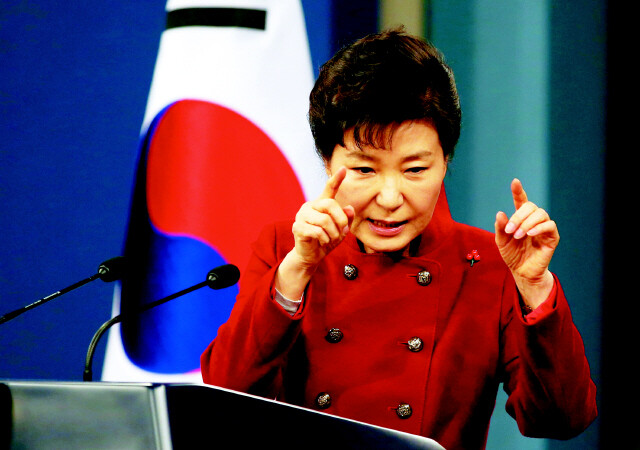hankyoreh
Links to other country sites 다른 나라 사이트 링크
Overseas media goes heavy on coverage of general elections

International news outlets showed a major interest in the Apr. 13 general elections, which ended in a harsh defeat for the ruling Saenuri Party (NFP).
Real-time updates were given on the results, along with numerous analyses on the election’s significance and future prospects.
“[President] Park [Geun-hye], a daughter of Park Chung-hee, South Korea’s military dictator from 1961 to 1979, has emerged as a highly divisive leader,” the New York Times noted on Apr. 13, adding that the election results “appeared to be a rejection of her style of governance.”
Describing the election as “a referendum on Ms. Park and a bellwether for the presidential election in late 2017,” the article said Park was left to “face the prospect of being an early lame duck.”
In terms of predictions, the newspaper said that “no immediate change” was expected in Seoul‘s foreign policy, but that “the progressive opposition will now be more likely to press Ms. Park to amend her hard-line North Korea policy.”
The Wall Street Journal identified economic conditions as a reason for the Saenuri’s defeat, noting that “South Korea‘s weakening economy may have turned voters away from Ms. Park’s party.”
“On Tuesday [Apr. 12], the International Monetary Fund lowered its growth forecast for South Korea for this year to 2.7%,” it observed.
“Household debt, meanwhile, has risen to a record $1 trillion as of the end of last year, while youth unemployment hit a record 12.5% in February,” it continued.
The Associated Press noted that voters “weren‘t swayed by national security issues as much as they were before,” despite recent threats and missile tests by North Korea. Instead, the article pointed to the worsening economy as voters’ top concern.
The BBC gave the election outcome headline coverage on its website, noting that it “dents President Park Geun-hye’s prospects of seeing her Saenuri party retain the presidency next year.”
The piece identified two reasons for the Saenuri defeat: its attempts to gut legal safeguards protecting workers from firing, and the suppression of left-leaning opposition parties and political opponents as “pro-North Korea.”
In Japan, news outlets focused on the potential impact of the outcome on relations between Seoul and Tokyo - and a recent agreement on the comfort women issue in particular.
During a press conference on Apr. 14, Japanese Chief Cabinet Secretary Yoshihide Suga fielded questions on whether the Saenuri defeat would mean problems in enforcing the Dec. 28 agreement.
“I don’t think [the election result] will have an impact on the agreement’s enforcement,” Suga said.
But Japanese media predicted the Saenuri rout would indeed mean setbacks for the agreement between the two sides’ foreign ministers on the issue of women forced into sexual slavery during Japan’s imperial days.
The Mainichi Shimbun newspaper noted that “the inevitable weakening of centripetal force for the Park administration is raising concerns about the impact on the two administrations’ agreement on the comfort women issue.”
The Nikkei newspaper predicted that with the opposition Minjoo Party of Korea winning a plurality of seats on a campaign of reopening the comfort women issue to discussion, Park “could adopt a harder line on Japan” after the defeat.
The Asahi Shimbun newspaper predicted “difficulties in signing a military intelligence protection agreement, which Japan had hoped to reach an agreement on before the end of the year.”
By Gil Yun-hyung, Tokyo correspondent
Please direct questions or comments to [english@hani.co.kr]

Editorial・opinion
![[Column] Season 2 of special prosecutor probe may be coming to Korea soon [Column] Season 2 of special prosecutor probe may be coming to Korea soon](https://flexible.img.hani.co.kr/flexible/normal/500/300/imgdb/original/2024/0426/3317141030699447.jpg) [Column] Season 2 of special prosecutor probe may be coming to Korea soon
[Column] Season 2 of special prosecutor probe may be coming to Korea soon![[Column] Park Geun-hye déjà vu in Yoon Suk-yeol [Column] Park Geun-hye déjà vu in Yoon Suk-yeol](https://flexible.img.hani.co.kr/flexible/normal/500/300/imgdb/original/2024/0424/651713945113788.jpg) [Column] Park Geun-hye déjà vu in Yoon Suk-yeol
[Column] Park Geun-hye déjà vu in Yoon Suk-yeol- [Editorial] New weight of N. Korea’s nuclear threats makes dialogue all the more urgent
- [Guest essay] The real reason Korea’s new right wants to dub Rhee a founding father
- [Column] ‘Choson’: Is it time we start referring to N. Korea in its own terms?
- [Editorial] Japan’s rewriting of history with Korea has gone too far
- [Column] The president’s questionable capacity for dialogue
- [Column] Are chaebol firms just pizza pies for families to divvy up as they please?
- [Column] Has Korea, too, crossed the Rubicon on China?
- [Correspondent’s column] In Japan’s alliance with US, echoes of its past alliances with UK
Most viewed articles
- 1[Column] Season 2 of special prosecutor probe may be coming to Korea soon
- 2‘We must say no’: Seoul defense chief on Korean, USFK involvement in hypothetical Taiwan crisis
- 3Is N. Korea threatening to test nukes in response to possible new US-led sanctions body?
- 4Amnesty notes ‘erosion’ of freedom of expression in Korea in annual human rights report
- 5Division commander ordered troops to enter raging flood waters before Marine died, survivor says
- 6N. Korean delegation’s trip to Iran shows how Pyongyang is leveraging ties with Moscow
- 7[Editorial] Korea’s surprise Q1 growth requires objective assessment, not blind fanfare
- 8Is Japan about to snatch control of Line messenger from Korea’s Naver?
- 9No good, very bad game for Korea puts it out of Olympics for first time since 1988
- 10[Reportage] On US campuses, student risk arrest as they call for divestment from Israel